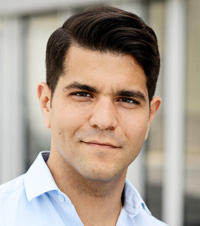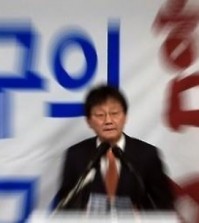- California Assembly OKs highest minimum wage in nation
- S. Korea unveils first graphic cigarette warnings
- US joins with South Korea, Japan in bid to deter North Korea
- LPGA golfer Chun In-gee finally back in action
- S. Korea won’t be top seed in final World Cup qualification round
- US men’s soccer misses 2nd straight Olympics
- US back on track in qualifying with 4-0 win over Guatemala
- High-intensity workout injuries spawn cottage industry
- CDC expands range of Zika mosquitoes into parts of Northeast
- Who knew? ‘The Walking Dead’ is helping families connect
Game developer calls addiction bill ‘a joke’
By Kwon Ji-youn
Khaled Helioui, CEO of Bigpoint, a Germany-based game developer, argues that a proposed bill on game addiction will hurt Korea’s gaming industry.
“This bill could be quite a big threat to the online game industry,” Helioui said during a recent interview. “The government might be putting at risk something they have built over the last 10 years.”
The bill was proposed by Rep. Shin Eui-jin of the ruling Saenuri Party on April 30 and places Internet games in the same category of addictive activities as drugs, alcohol and gambling.
Helioui questioned whether it is the government’s place to tell parents how to raise their children.
“If children become overweight, is the government going to tell them that they’re forbidden from eating a certain type of food? Personally, I think it is hilarious to put games at the same level as alcohol, drugs and gambling. It’s a joke,” he said.
He asserted that lawmakers are creating problems that do not exist in order to claim they are fighting for the well-being of the country’s youth.
“Cigarettes and alcohol are problems that continue to affect people’s lives, but how many people are going to say that games ruined their lives?” Helioui asked.
“It’s not only dishonest ― it’s disingenuous. They’re afraid to tackle bigger problems and are trying to raise attention in a different way.”
Helioui’s company, Bigpoint, recently partnered up with NHN, the operator of the nation’s dominant Web portal Naver, to launch its game Drakensang, a browser-based game with graphics comparable to PC and console games.
Helioui visited Korea Nov. 16-18 to attend G-Star 2013, a global game exhibition that took place in Busan, and to promote Drakensang.
“I was a professional gamer when I was younger,” Helioui recalled. “I knew if we wanted to become a leader, we would have to be present in Korea. Korea is the most demanding market in the games industry, and it’s where people have the highest expectations.”
But Helioui pointed out that the overall reaction to this year’s exhibition was one of disappointment.
“Over the past year, there has been a shift in the mindset of Korean game companies when they saw the emergence of the mobile market,” he noted. “Most of the game companies in Korea started moving their strategies to mobile, because that’s where they assume the market is going. But that is not the case.”
He said, “Over the next three years, people expect the mobile market to grow a lot, but so will the traditional game market.”

















